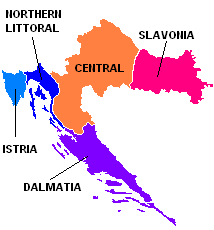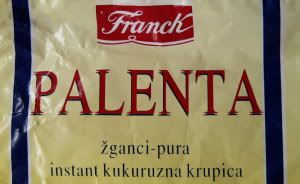• • • Review: How to Curse, Slang
Warning! This entry contains words that can disturb some people :)
Slang uses "vulgar" words and words derived from them to express everyday things, not "vulgar" at all. It also uses other words to express sexual and taboo concepts.
The main "vulgar" word is the verb jebem, jebao "fuck". In slang, this verb gets more meanings, and derived verbs have diverse meanings, which are connected with "strong" or even "violent" things.
The verb jebem in slang on its own also means "bother", "worry", similar to Standard Croatian verb mučim, with one who suffers in acc., and the cause in nom., e.g.:
Jebe me matematika. "Math is annoying me."
However, if used in an impersonal dative construct (with za + acc.), it means "not give a damn":
Jebe mi se za matematiku. "I don't give a damn about math."
Mind that the verb is impersonal in this construct, that is, in the 3rd pers. sg. n always! Search for "jebe mi se za" on Google™ to see how often it's used. While most consider it vulgar, it's sometimes found in Internet media, e.g.:
Eto'o: Jebe mi se za Arsenalovog Henryja "Eto'o: I don't give a damn about Henry from Arsenal" (source)
Some derived verbs used in slang are:
zajebavam ~ zajebem, zajebao "joke", "cheat", "take advantage of"
najebem, najebao perf. "get hurt", "get caught", "suffer"
odjebem, odjebao perf. "go away"
Since all those verbs are derived from jebem, they are still considered vulgar, however they are more acceptable than jebem, kuräc etc.
The verb zajebavam ~ zajebem, zajebao is often used in informal speech, in broad meaning "behave irresponsibly", "deceive", similar to English "fool" (and "screw up" or "fuck up" in slang).
Imperative odjebi means "go away" (similar to English slang "fuck off"). For instance, a Croatian pop group had a song with a line Odjebi od mene:
Zatvori prozor i pokrij me
Tiho zaključaj vrata
Odjebi od mene
Tiho zaključaj vrata
Odjebi zauvijek
Tvoje lice, tvoje rijëči
Postale su preblijëde
Uzmi šal i svoju glazbu
Odjebi od mene
Uzmi šal i svoju glazbu
Odjebi zauvijëk
Passive adjective jeben means "superb", "outstanding", while adverb jebeno means "extremely", similar to English slang "fucking":
Jebeno je hladno. "It's fucking cold."
Kuräc has a meaning "something (worthless)" in slang, like in phrases:
za kuräc "not valid, not functioning"
koji kuräc "why" (also koje sranje)
neki kuräc "something" (also neko sranje)
idem na kuräc "irritate"
It can be used as an adverb, meaning "no way", "won't happen", that is, strongly negating the whole sequence:
hoćeš kuräc "no way you'll do it"
Slang has also "replacements" for some vulgar words, for instance verbs karam or fukam instead of jebem. Replacements for kuräc are the following nouns:
Zagreb Split banana
kara
čuna
đoko
veseljko
kita
For instance, The Beat Fleet (TBF), a popular group from Split, used various words for penis in their hit Veseljko, a song that leaves no doubt what it is about:
Kad dotaknem zvijezde
Zaplovim u svemir
I kako čovjek je mali
A život je ko rijeka
Možda još večeras upozna mog
Mog Veseljka
"When I touch the stars
Set sails into universe
And how man is small
And life is like a river
Maybe even tonight she'll meet my
My willy"
A really "strong" language is present in a song by Edo Maajka, a Croatian-Bosnian rapper:
Budi popularan sine,
nek ti misice puše kuräc
Ko Zdravko Čolić,
karaj sine sa estrade cure fine . . .
Budi ko Halid imaš glasa,
u selu budi faca
Nek ti Huljić radi ploču,
pa karaj danju i noću . . .
De mi reci Denis,
koji kuräc tj. penis
Hoćeš od mene, ko si,
sa vrata mi se mali nosi
Gospon Huljić, ti ne slutiš,
ja sam nova nada kužiš
Imam eura znam pjevat,
hoću non-stop jebat
Updated 2012-10-27
 Croatia has broadly 5 distinct historical regions, which can be grouped to coastal (Istria, Northern Littoral, Dalmatia) and inland (the rest). Generally speaking, the coastal regions have a lot of Mediterranean influences (chiefly Venetian), and the inland has a lot of German influences. The major coastal city is Split, while the major inland city is Zagreb (the capital). Of course, there's traditional animosity, football rivalry, etc. It's impossible to list all differences, let's say there are differences in mentality, culture, attitudes etc. Croatia is a land of striking regional differences, from voting patterns to eating habits.
Croatia has broadly 5 distinct historical regions, which can be grouped to coastal (Istria, Northern Littoral, Dalmatia) and inland (the rest). Generally speaking, the coastal regions have a lot of Mediterranean influences (chiefly Venetian), and the inland has a lot of German influences. The major coastal city is Split, while the major inland city is Zagreb (the capital). Of course, there's traditional animosity, football rivalry, etc. It's impossible to list all differences, let's say there are differences in mentality, culture, attitudes etc. Croatia is a land of striking regional differences, from voting patterns to eating habits.